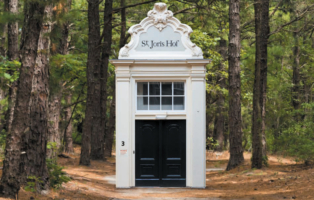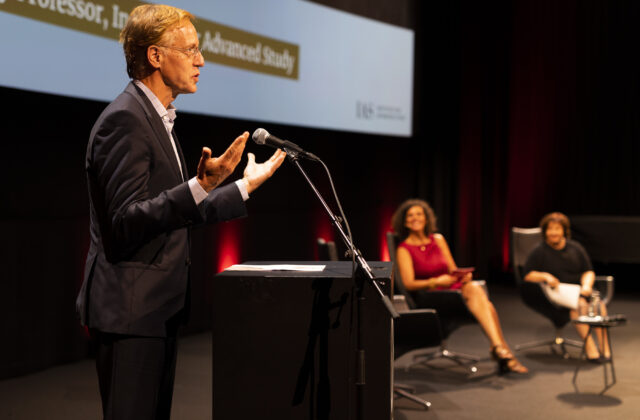
Scholars at Risk: The Institute for Advanced Study and Academic Freedom
by Robbert Dijkgraaf
By Robbert Dijkgraaf, Director and Leon Levy Professor at the Institute for Advanced Study in Princeton, USA. Currently Minister of Education, Culture and Science in Dutch government. This essay was presented during the NIAS Opening of the Academic Year 2021/22 and included in the publication “NIAS 50 Years of Academic Freedom“.
The Idea of an Institute for Advanced Study
The Institute for Advanced Study in Princeton was the realisation of a dream of its first director Abraham Flexner. It was meant to be a paradise for scholars, a place where one could dedicate oneself to the pure pursuit of knowledge, with no disturbances or obligations. It was and still is more defined by the absence than the presence of things – no teaching, no committees, no laboratories, no instructions from government or industry. A point of reflection outside the plane, as far removed from the real world as possible.
In many ways, this dream has turned out to be a great success. And we are proud of our more than 90 years of dedication to scholarship and research at the highest level. Currently, there are more than six thousand scholars around the world who have benefitted from this intellectual recharge.
We are particularly proud that the idea of an IAS itself has proven to be so fertile. Hundreds of Institutes have been created around the world. Remarkably, there is a huge amount of biodiversity in that family. Mirroring Tolstoy’s words, all universities are to first approximation alike, but every Institute is completely distinct because there are so many things that it is not. Each makes different choices of disciplines, funding models, locations, presence of permanent faculty, intellectual goals, and interactions with society. But the common denominator is the intellectual freedom to pursue knowledge in and by itself, unbounded by applications or governmental regulations. The connecting thread is the absence of the thought police.
The connecting thread is the absence of the thought police
Scholarship as Reaction to Political Emergency
In Princeton, something special happened in February of 2017. President Donald Trump had just been inaugurated and one of the first actions his administration took was the establishment of the so-called travel ban, mostly directed towards Muslim countries. This measure left the country and the world in shock, particularly our own community in Princeton, where so many scholars from around the world had gathered. The United States, which has a history and a self-image as a beacon of freedom and a refuge for scholars at risk, suddenly showed an ugly image to the world. The travel ban came with brutal immigrant deportations, attempts to limit scientific inquiry and expert advice, drastic cuts in the funding of the arts and humanities, and a general attack on facts and the truth itself.
During those months, we organized several town hall meetings to share our concerns about this new regime. Then the scholars on campus did something remarkable. They decided to react to this political emergency with their own tools: scholarship. A very diverse group of social scientists, historians, mathematicians, and physicists felt the need to organize themselves and dive deep into our archives to investigate how colleagues in previous generations had reacted to such distress, and to find inspiration and learn lessons for the present and the future.
As this so-called History Working Group wrote, “Travel restrictions involving pure accidents of birth, documented by passports from flagged countries, have prompted us to revisit today the Institute’s history not because we believe that history repeats itself. Rather, we seek to provide the IAS community with sketches of scholarly lives and scientific cultures, interrupted by nationalist forces of exclusion. That these lives and cultures managed to reconstitute themselves and enrich our common human heritage is thanks only to efforts to provide them with sanctuary.”
Scholars at Risk in Nazi-Germany
In 1933, only three years after its founding, the IAS was presented with a unique opportunity. Suddenly many renowned scholars from the upper echelons of the German university system had to leave Nazi-Germany, fearing for their lives. However, it was not immediate clear for Flexner how he could act. The Institute had recruited Albert Einstein and John von Neumann shortly before Hitler’s coming to power. But how far should they continue in recruiting additional émigrés? Flexner initially expressed ambivalence on the topic, torn between a desire to live up to founding ideals and concern over the need to support and foster local talent. As he wrote to the mathematician Oswald Veblen on March 27, 1933:
“Mr. Bamberger and Mrs. Fuld [the founders of IAS] were very anxious from the outset that no distinction should be made as respects race, religion, nationality, etc., and of course I am in thorough sympathy with their point of view, but on the other hand if we do not develop America, who is going to do it, and the question arises how much we ought to do for others and how much to make sure that civilization in America advances.”
On May 2, again responding to Veblen, he expanded on the same theme:
“We are certainly in the devil of a fix. Unable to care for our own younger men, we are pressed by applications from foreign countries. It seems to me clear that we must in the first place endeavor to find work for those whom we have encouraged to train themselves in this country on the theory that, if they were worthy, there would be jobs waiting for them. Until we have done that, what else can we do? Our opportunities for making places for foreigners are therefore at the moment limited to a few outstanding personages such as Einstein and Weyl.”
In those Depression years, there was a widespread “America First” attitude. But, after expressing this initial hesitation, Flexner took strong action. In association with the Emergency Committee in Aid of Displaced Foreign Scholars, the Rockefeller Foundation, and the Carnegie Foundation, IAS became a sort of intellectual Ellis Island. Small grants allowed scholars to obtain visas to escape Nazi Germany and come to Princeton. Ironically, the Institute was founded by the Bamberger family, which owned a large department store in Newark dealing with distressed merchandise. Now their philanthropy suddenly dealt in distressed scholars, acquiring geniuses at bargain-basement prices.
The impact of these European scholars was huge. In his Director’s Report in 1939 Flexner writes,
“Fifty years from now the historian looking backward will, if we act with courage and imagination, report that during our time the center of gravity in scholarship moved across the Atlantic Ocean to the United States. It is a grave responsibility which is thus being thrust upon us all.”
Einstein, McCarthy and the right of scholars to speak their minds
Until his death, Einstein kept on fighting for the right of scholars and scientists to speak their minds, about everything. He crafted his statements as carefully as his formulas, going through many versions, and placing the final text in a wooden box. He was tweeting avant la letter.
His political activism was called upon again during the McCarthy years when the political climate in the country was becoming increasingly hostile to scientists, teachers, journalists, and artists. In November 1954, at the highpoint of Joseph McCarthy’s campaign against the supposed communist infiltration of the U.S. government, Einstein wrote a letter to a magazine in which he declared that were he a young man again, he would not try to become a scientist: “I would rather choose to be a plumber or a peddler in the hope to find that modest degree of independence still available under present circumstances.” Around the United States, plumbers responded and Einstein was offered membership in the Chicago plumbers union.
McCarthy was quick to react to Einstein’s stand. He told the media that whether his “name is Einstein or John Jones,” the giver of such advice was undoubtedly an “enemy of America,” “a disloyal American,” and “not a good American.” But Einstein was in no way deterred. In a public statement in March 1954, he advocated for “the right to search for truth and to publish and teach what one holds to be true.” He regretted that in this dark age “freedom of teaching, mutual exchange of opinions, and freedom of press and other media of communication are encroached upon or obstructed.”
The director of the Institute at the time, Robert Oppenheimer, was himself a target of McCarthy’s inquisition. He was squeezed by the hinge of history. On the one hand, he was a loyal servant to his country developing the atom bomb, on the other hand, he was firm in his stance for international collaboration and against the further development of nuclear arms. McCarthy accused him of being a communist, and he famously lost his security clearance in the hearing of the Atomic Energy Committee. Earlier he was celebrated as the world’s most famous scientist, with the possible exception of his colleague Einstein. He appeared on the cover of Time Magazine in 1947 as a national hero. In June 1954, he was again on the cover, now with the byline: “Beyond loyalty, the harsh requirement of security.”
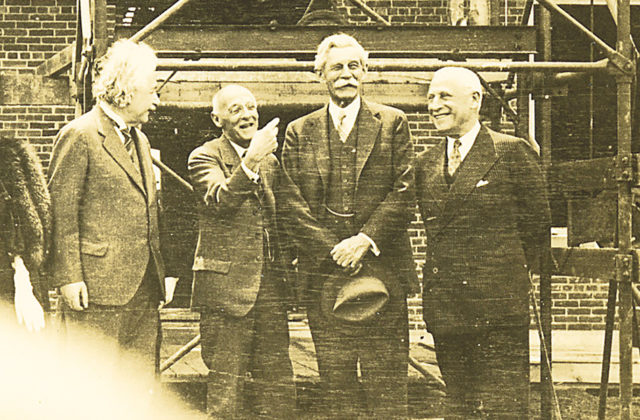
Increase intellectual biodiversity
These days we see growing attacks on academic freedom around the world. The intellectual space is shrinking. Governments and political movements more and more want to impose their views. Populists claim to represent the true views of the nation and try to silence other voices. Facts are pushed away by alternative facts. Scientific findings are undercut by sowing doubt and the spread of disinformation, often disguised as science. In the United States, where Trumpism is still very much alive—although no longer in the White House—these attacks are often framed as a reaction to an excess of “political correctness” in academia. A favourite technique is to shoot the messenger bringing uncomfortable news.
The great challenge for the scholarly community will be to preserve and strengthen our academic freedom, to keep expanding our view, and to allow as many different perspectives as possible. Keep the thought police out, also among ourselves. It is never our aim to be comfortable, reach a consensus, or stop asking difficult questions. How can more knowledge, digging deeper and uncovering more layers, be in any way threatening? Knowledge is the only natural resource that grows when being used. It should be the aim of any institution of higher learning to increase its intellectual biodiversity, both in-depth and breadth. If someone calls a university to ask what it thinks about a certain matter, the answer should not be, “To whom can I direct your call? Just let me know which opinion you want to hear.”
What role can an Institute for Advanced Study play in this large and complicated world? Isn’t it just a drop in the proverbial bucket? Is the whole idea of creating a bubble of freedom, a Platonic environment, an intellectual playground, not irrelevant and perhaps even misleading, creating a fake sense of security and comfort? Why create a paradise for scholars, in such an ugly world?
Why create a paradise for scholars in such an ugly world?
Perfect rock
Let me end with an anecdote of Albert Hirschman, one of the most important social scientists and philosophers of the 20th century, and a long-term faculty member of the IAS. In his early years, he was blown around the world by the winds of war. In many ways he was the last of the distinguished line of European refugee scholars, beginning with that other Albert, who finally found a home in Princeton. Born in Berlin, fleeing Nazi-Germany, barely 18 years old, for France, he fought in the Spanish War, then helped some 2,000 refugees escape in the South of France in 1940, among them Marc Chagall, Marcel Duchamp, and Hannah Arendt. He joined the U.S. Army in North-Africa and Italy, followed by a most distinguished academic career, ending in 1972 at the IAS.
A life-long lover of mountain hikes, Hirschman once reached the summit of a mountain in the French Alps with one of his grandsons. Here the young boy found a rock, naturally carved into the perfect shape of a chair. He sat down and decided he did not want to move again. He had reached perfection. Why should one move further?
How did the great and wise philosopher solve this problem? Hirschman took his mountain axe and chipped off a small part of the rock and put the piece in his grandson’s pocket. With this one gesture he achieved two things. The resting spot was no longer perfect. But a small part of that lost perfection he could take down, into the real world, as an inspiration for future hikes.
-
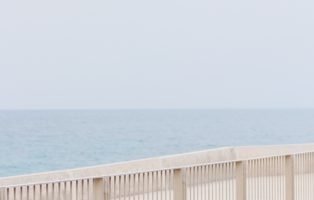 Insights
InsightsWhat is Academic Freedom?
-
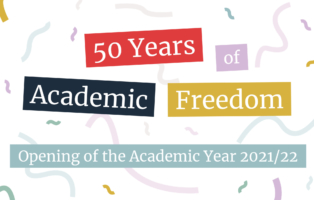
-
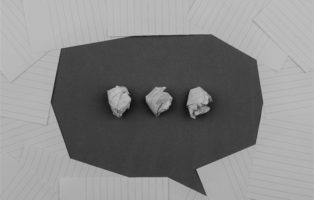 Insights
InsightsOn Academic Freedom
-
